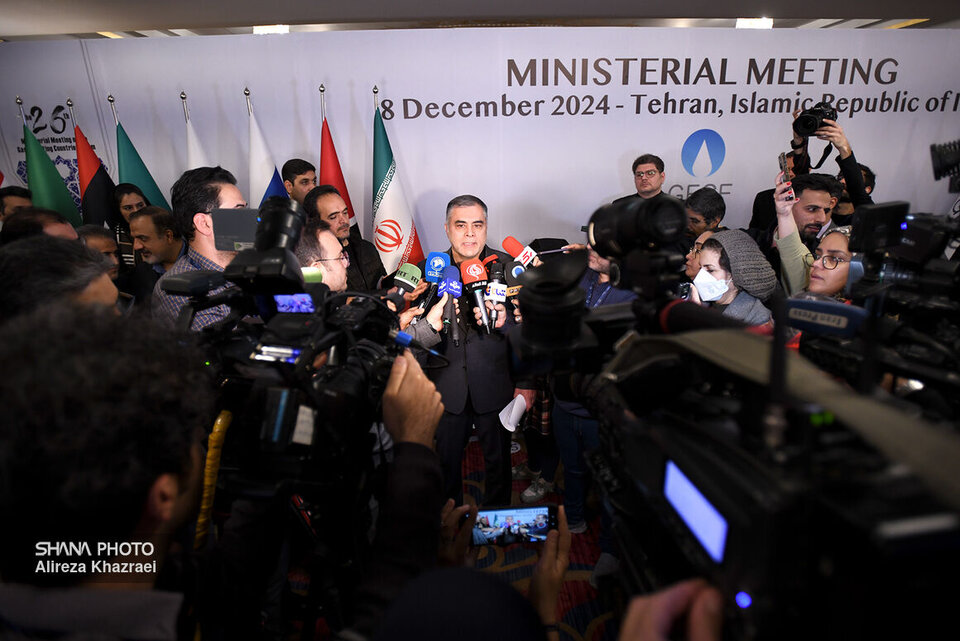On Sunday, in the sidelines of the 26th Ministerial Meeting of the Gas Exporting Countries Forum (GECF) in Tehran, Mohsan Paknejad told reporters that GECF members arrived in Tehran on Friday, and expert-level meetings took place with executive teams.
He added that on Saturday, the delegations visited the Research Institute of Petroleum Industry to learn about Iran’s oil and gas capabilities.
Paknejad emphasized that Iran's oil industry expertise is a pathway to entering technical and engineering exports. He added that today’s meeting would focus on decisions made by the executive teams during the previous meetings, which continued late into the night.
The minister noted that the GECF consists of countries with the largest proven natural gas reserves, and these countries play a significant role in global gas trade.
He pointed out that decisions made by countries like Russia, Qatar, and Iran—second in global gas reserves—alongside key and observer members, are impactful on international markets and gas trade.
Gas’s continued role in global energy
Paknejad also remarked that the GECF, often referred to as the "OPEC of gas," plays a role similar to OPEC's in regulating global crude oil supply.
He stated that all attendees at the 26th Ministerial Meeting emphasized that natural gas will remain a key energy source for years to come.
The oil minister further stressed that the notion that fossil fuels will quickly lose their role in energy supply is unrealistic. He added that the ongoing discussions would lead to finalized agreements and decisions.
Regarding afternoon discussions, Paknejad mentioned that one key topic would be the extension of the GECF Secretary-General's term. According to the GECF charter, the secretary-general can serve two consecutive terms of two years, but a proposal to extend this to two terms of three years was raised at the previous meeting in Egypt and will be decided upon.
He added that other matters under discussion include internal issues, the GECF Secretariat, its budget, and the financial contributions member countries are required to make for the secretariat's operations.
Iran has not yielded to sanctions
In response to a question about how the GECF could help Iran achieve its goal of becoming an energy hub in the region, Iran's oil minister said: "Given that Iran faces challenges like sanctions, solutions to overcome these sanctions have been devised in recent years. It has never been the case that we have yielded to these limitations. Naturally, the more complex these restrictions are, the more tailored our solutions become."
Paknejad emphasized that Iran's presence as the second-largest holder of gas resources in the world in forums like the GECF demonstrates that Iran plays a key role in the global energy market.
He noted that Iran can still have a significant influence on international energy decisions, adding that "Thus, hosting this meeting helps us achieve our national goals of making Iran an energy hub."
He described the meeting as aligned with the energy diplomacy transformation under the 14th administration, adding, "We are certainly committed to turning Iran into an energy hub despite international sanctions, and holding the GECF summit provides an excellent opportunity for Iran to play a significant role in international energy markets."
Signing major gas contracts by year-end
When asked whether Iran, with its 2% share of the global gas trade, has hopes of becoming a major gas hub in the future, Paknejad responded: "We always keep hope alive. What is certain is that we have a realistic hope for this and will work toward it."
The oil minister addressed the Iranian people, stating: "I want to announce to the media and the people of Iran that we will soon, or perhaps before the end of this year, sign several high-value oil and gas contracts, particularly in the gas sector, with fully defined financing plans."
He noted that some of these contracts would involve gas pressure-boosting projects in the South Pars field with domestic companies. "With these contracts in place, Iran's gas production will increase according to a specific timeline," Khatibi said, adding that they may also utilize technology from other countries if needed.
Formulating solutions for potential restrictions
In response to a question about whether Iran would be forced to reduce its oil production due to intensified sanctions with the new US administration, Paknejad asserted: "Increasing Iran’s oil production capacity has nothing to do with sanctions or their intensification. Expanding oil production capacity is a key priority for the Ministry of Petroleum under the 14th administration."
He stressed, "The more restrictions are imposed, the more solutions are being prepared by the hardworking children of the Iranian oil industry to overcome any potential limitations. Therefore, the people of Iran need not worry about this issue."


Your Comment